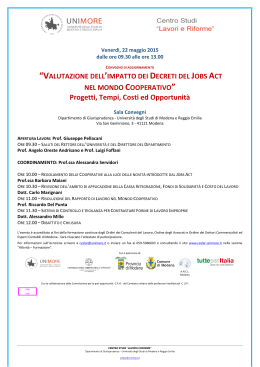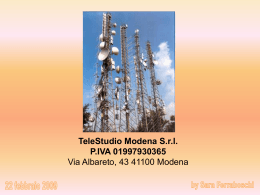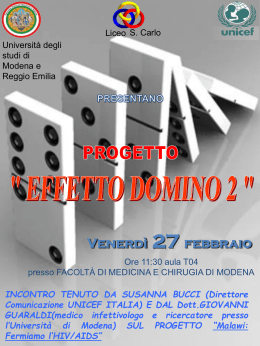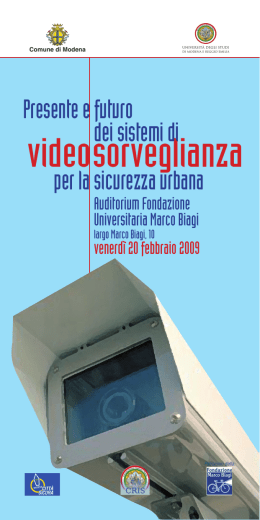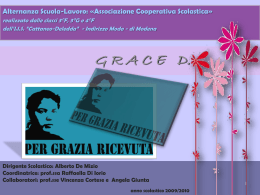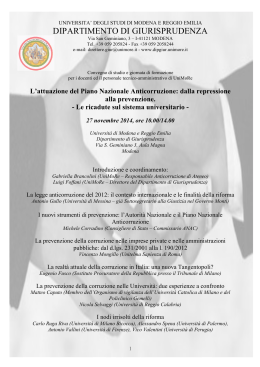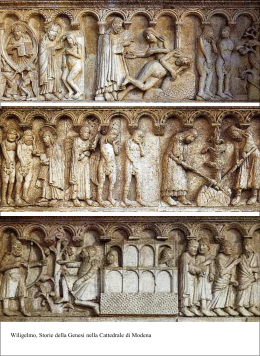INSITE Workshop WP 7 - Generalized ICT: how cities and museums augment human learning, individually and collectively Modena - Italy, 12th and 14th-15th April 2014 Officina Emilia venue Narrations and communities: building communities for making citizenship Which are the contributions of narrations in building sustainable communities? The organization of the workshop in 7 sessions The workshop “Narrations and communities: building communities for making citizenship” will address the issue of narrations as practices for building communities’ identities. This workshop is the contribution of the INSITE Project, a EU Coordination Action, whose goal is fostering the dialogue between researchers and practitioners on “How to build a sustainable society, environmentally sustainable and socially responsible” [www.insiteproject.org]. A Manifesto of Social Sustainability has been issued as an outcome of this CA. The workshop is open with the symbolic delivery to the town of “A lathe at school”, an on line story valuing local network of competences, the workshop begins on Friday, 11th April 2014, during the Modena municipality sponsored event: “Museums to be tasted, the flavor of the (re)discovery”. The WP7--“Generalized ICTs” focuses on the primary functionality of information and communication technologies, conceived as that of augmenting human learning, both individually and collectively: to this respect, also cities and museums, at macro and meso level, respectively, have this role. Which specific infrastructures enable interactions that enhance the exchange of information, as well as the acquisition and creation of new knowledge? We are not referring here only to the places formally in charge of this purpose, such as schools, universities, research or cultural centers, theaters and museums. We mean public spaces - designed or activated by users - to enhance interactions amongst people, such as squares, urban gardens, meeting places, Fab Labs, hybrid venues, just to name a few of them. What is the role of narrations in the design and activation of such spaces and within the interactions of their users? Who is creating these narratives and for whom? Which are the infrastructures, practices and languages able to convey information, and at the same time to support the dialogue and the interaction within and across communities? These are the core research themes of INSITE, aimed at contributing to the issue of “building an inclusive Europe” that encompasses all EU’s multiple identities, and therefore different narratives, also by means of a smart and reflexive use of ICT, on which the European Commission has been investing in the last decades. The European Commission is currently looking for actions and instruments capable to encourage citizen participation, with respect to ever-changing communities in which we are living, and it is more necessary than ever to include those who come to be part of the European Community from a certain point onwards. With a focus on narrative practices relevant in building communities, being themselves social practices and not mere self-narrations, in the workshop we intend to focus on how the many narrative practices - deep-rooted in the history and processes of humankind - are changed and how they are used nowadays. On 12th April, the INSITE workshop will focus on ICTs for museums: tools aimed at creating virtual exhibitions of museums’ collections, and at enhancing and managing online digital storytelling that can appraise museums’ intangible heritage. The collections show off for an opening which widens the horizon of their use, and not just in a temporary way. During the afternoon session, participants will have the opportunity to interact with Homm-sw, an ICT application developed by the Modena and Reggio Emilia University, within the Officina Emilia lab-museum in collaboration with Crafts Museum (New Delhi, India), and to construct their own projects of storynets. After having explored the contribution of museums, on Monday 14th April, the workshop will open up to contributions on the role of narrations in social innovation and local development processes. Then it will proceed on Tuesday 15th April with contribution from theater, visual arts, urban games, bottom-up community practices and tools for citizens engagement, such as e-deliberation. What links the issues addressed by generalized ICTs, such as museums and cities, or projects such as La Notte del lavoro narrato, Il Palio del Grano, Il Villaggio dell’Arte, Come to Venice to the European Commission issues on social inclusion and participation? The workshop will highlight that they all make use of practices (such as performing arts, visual arts, games), techniques and tools that rely on social relationships and also on information and communication technologies, to create spaces of interaction fostering shared knowledge and meanings. Saturday 12th April 2014 | h 9-18 & h 21-23 Monday 14th April 2014 | h 10.30-17.30 Session II – Museum & ICT tools for virtual exhibitions and digital story telling Session IV - Narration and community building: theoretical issues Museums. Social inclusion, lifelong learning and the regeneration of competence networks are key processes which foster innovation. Museums may play an important role in these processes and ICT can strongly support the effectiveness of the interventions required in the formation of personal and community identities, and the construction of meanings 10.00-10.30 coffee to start 9.15-13.00 10.30-13.00 Virginia Tassinari (Social Spaces DESIS Lab/MAD Faculty – Genk, Belgium), Narrative, media and social innovation Paolo Gurisatti (ECLT, UniVE, Italy) e Antonio Santangelo (UniTO, Italy), Narratives and local development processes Tommaso Minerva (CEA-UniMORE, Italy) Welcome & Introduction Maria Teresa Natale (ICCU, Italy, Athena+), Movio_A CMS to create and manage on line virtual exhibitions Perla Innocenti (University of Glasgow, United Kingdom) Migrating heritage and approaches to digital storytelling Margherita Russo (UniMORE, Italy) Homm-sw. ICT tools to enhance tangible and intangible heritage Comments and discussion Margherita Russo (UniMORE, Italy) Official ceremony “Un tornio a scuola/A lathe at school_A storynet on competence networks in mechanics”. A contribution to value an intangible heritage of the local community. With the Mayor of Modena, Giorgio Pighi Elisa Bertolotti, Francesca Piredda, Simona Venditti (Politecnico, Milan, Italy) Audiovisual storytelling: the experience of ImagisLab - Plug TV Ruchira Ghose (Crafts Museum, New Delhi, India) Transforming a museum Marianna Marcucci, Fabrizio Todisco (Invasioni Digitali, Italy) “Digital invasion” to enhance cultural heritage Eleonora Lupo (Politecnico, Milan, Italy) Augmented technologies for museums and cultural heritage Comments and discussion: Chiara Beni (Sistema Museo, Italy); Julia Katona (Museum of Fine Arts, Budapest, Hungary) Lunch 13.30-15.00 Session III – Parallel laboratories to use homm-sw 15.00-18.00 [with coffee break] Margherita Russo Giulia Piscitelli and Elisabetta Zironi, ICT architecture of homm-sw 30’tutorial + 90’ to create a storynet in a personal workspace by using homm-sw. Invited attendees: Julia Katona, Ruchira Ghose, Maria Teresa Natale, Narula Kritica Sharma, Federica Rocchi, Laura Barbieri, Ivana Taverna, Chiara Beni, Cristiana Zanasi, Marco Panizza, Ivan Ongari, Paola Mengoli, Ece Özdil, Daniela Roncaglia To create your own storynet: bring with you files in the following format: Video mp4; Audio mp3; Images jpg 1024x768; Texts pdf For each clip please create an image for a thumbnail .jpg 160x120 Lunch 13.00-14.30 Session V - Narrative and community building: experiences in policy design 14.30-17.30 Tono Cruz (artist, B:Lee, Spain) Citizen participation in the projects of urban art Mario Festa (architect, Italy) From the project on Matese to RuRal Design: Fragments of a discourse to be composed 15’ break Comments and discussion Giulia Piscitelli (Officina Emilia, UniMORE, Italy), Valentina Anzoise (ECLT, UniVE, Italy) Tuesday 15th April 2014 | h 9.30-18.30 & h 21-23 Session VI - Narration and community building: the contributions of theatre and visual arts Visual arts. Society has always been represented by images. If there is an “incompatibility of worlds and words [and] a oneto-one correspondence is impossible if media are different”, is important to involve who contributes in building communities by means of visual arts. Theater. The theater, permeable to the social, creates a common language area for the sharing of knowledge and information, and makes possible the understanding of things which can be understood only when taken as a whole. These are inclusive practices, that the theater puts in place using techniques and tools able to accompany the observation, the writing and the theatrical action, and in which the interactions with people (and later with the audience) are an essential part of the process through which collective energy are generated. 9.30-13.00 h. 19.30 dinner at Caffé Concerto (Piazza Grande, Modena) Claudio Longhi (theatre director, Italy) From the experience of "Ratto d’Europa" to the school "Telling the territory" by Emilia Romagna Teatro Foundation h. 21-23 Novemetis at Officina Emilia Bruna Gambarelli and Federica Rocchi (DOM Theatre – La cupola del Pilastro, Italy), The experience of Laminarie at DOM THE IMPROVADERS present IMPROBUBBLE Vincenzo Mingiardi, guitar Alberto Tacchini, electric piano and synthesizers Pacho, drums and percussions Tiago Prata (TILTT and Culture Clash Europe, Sweden) TILTT and Culture Clash Europe 10’ break WorkshopINSITE_Modena_12-14-15April_final.doc 2 Benedetta Panisson (visual artist, Italy) and Amerigo Nutolo (curator of art exhibitions), Italy), Come to Venice Comments and discussion Renata Molinari, Marco Scotti; students (Master in Economics, Unimore) Lunch 13.30-14.30 Session VII - Narration and community building: the contributions of urban games and bottom up practices Games. The focus is on urban games, in which ICTs interweave with people interactions in the exploration of the real world. In addition to the scientific debate on software architectures , the focus will be on the kind of narratives that could be found in this kind of games. Bottom up practices. Two projects, the "Palio del Grano" and "La Notte del lavoro narrato", allow us to broaden our vision towards techniques and tools that draw on visual arts, theater and games. Here is the community that acquires them to build actions aimed at changing perspectives 14.30-18.30 Ilaria Mariani, Davide Spallazzo, Maresa Bertolo (Politecnico, Milan, Italy) Urban Games e fictional worlds: definitions and contemporary reflections Alberto Lusoli (ECLT, UniVE, Italy) e-deliberation at Cesena: a very serious game Comments and discussion Elisa Bertolotti (Politecnico, Milan, Italy); students (Master in Economics, Unimore) 10’ break Benedetta Giudice (Palio del Grano, Italy) From the "Palio grain" - promoting sustainable communities in a rural area in Southern Italy - to the involvement of Mediterranean communities Vincenzo Moretti (sociologist, Italy), Le vie del lavoro. Storytelling and participate survey Comments and discussion with Filippo Tantillo (Isfol, Italy); Ivan Ongari (City Councillor, Suzzara Mantova), Anna Natali (Eco&Eco, Italy); students (Master in Economics, Unimore) Organization and logistics INSITE [http://www.insiteproject.org] is a Coordination Action, directed by David A. Lane, on “The innovation society, sustainability and ICT”. It is sponsored by the European Union program Directorate General for Communications Networks, Content and Technology [DG CONNECT]. The Insite workshop “Narrations and communities: building communities for making citizenship” Modena 11th-15th Aprile 2014 is organized by Margherita Russo, with Valentina Anzoise, Alberto Lusoli, Giulia Piscitelli, Federica Rocchi and Stefania Sardo. Agnese Boscarol and Cristina Manente (ECLT) support organization and logistics. Contacts: administration &logistics Agnese Boscarol [email protected] Cristina Manente [email protected] Venue in Modena Officina Emilia, project of the University of Modena and Reggio Emilia, will host the workshop. Via Tito Livio 1, Modena. How to reach Officina Emilia http://www.officinaemilia.unimore.it/site/home/contatti/comearrivare-a-oe.html bus 9/9A toward Officina Emilia: direction Cittanova/Marzaglia, stop “Emilia ovest Globo” time schedule from Railway station: every 20’ at .01, .21 .41 each hour [6am to 7pm] time schedule from bus station: every 20’ at .05, .25 .45 each hour [6am to 7pm] bus 9/9A from Officina Emilia direction autostazione/stazione ferroviaria time schedule from via Emilia Ovest Globo: every 20’ at .13, .33, .53 each hour [6am to 7pm] Official languages Both English and Italian will be used in the workshop. Wifi connection Wifi connection will be available during the workshop. Participants should send Erminia Di Santo [email protected] a scanned copy of an identity card or passport to access the university wifi. Hotels and Restaurant h. 21-23 Novemetis at Officina Emilia Details on hotels reservation and restaurants will be given to the participants by ECLT Fragile Orchestra, conduction performance Special diet Luca Perciballi, conductor, Mattia Scappini, live painting Riccardo Marogna, bass clarinet Stefano Borghi, clarinet Ivan Valentini, soprano sax Gianluca Chiarini, sax Gabriele Fava, sax Giovanni Benvenuti, sax Michele Bonifati, guitar Giulio Stermieri, electric piano Simone Di Benedetto, double bass Andrea Grossi, double bass Riccardo La Foresta, drums Please inform Agnese [email protected] of any need for your diet WorkshopINSITE_Modena_12-14-15April_final.doc Welcome cocktail and dinner on April 11th Margherita Russo and Paolo Gurisatti will be pleased to meet at dinner the participants who arrive on April 11th . Meeting point: Central Park Hotel, at 7.00-7.30 pm, for a cocktail at the hotel and dinner in a restaurant a walking distance. Please, confirm with Agnese [email protected] 3 List of participants Valentina Anzoise [ECLT, University of Venice, Italy] [email protected] Pia Areblad [TILTT and Culture Clash Europe, Sweden] [email protected] Laura Barbieri [Sindacato, Modena, Italy] [email protected] Chiara Beni [Sistema Museo, Italy] [email protected] Elisa Bertolotti [Politecnico di Milano, Italy] [email protected] Massimo Bressan [Iris, Prato, Italy] [email protected] Tono Cruz [artist, Spain] [email protected] Mario Festa [architect, Italy] [email protected] Bruna Gambarelli [DOM – La cupola del Pilastro, Italy] [email protected] Ruchira Ghose [Craft Museum, New Delhi, India] [email protected] Benedetta Giudice [Palio del Grano, Italy] [email protected] Paolo Gurisatti [ECLT, University of Venice, Italy] [email protected] Perla Innocenti [University of Glasgow, United Kingdom] [email protected] Julia Katona [Museum of Fine Arts, Budapest] [email protected] Claudio Longhi [ERT Emilia Romagna, Italy] [email protected] Eleonora Lupo [Politecnico di Milano, Italy] [email protected] Alberto Lusoli [Università di Venezia, Italy] [email protected] Marianna Marcucci [Invasioni digitali, Italy] [email protected] Ilaria Mariani [Politecnico di Milano, Italy] [email protected] Paola Mengoli [Officina Emilia-University of Modena and Reggio Emilia, Italy] [email protected] Tommaso Minerva [University of Modena and Reggio Emilia, Italy] [email protected] Renata Molinari [Milano Teatro, Scuola Paolo Grassi, Italy] [email protected] Vincenzo Moretti [Fondazione di Vittorio, Italy] [email protected] Kritica Sharma Narula [Craft Museum, New Delhi, India] [email protected] Maria Teresa Natale [Istituto Centrale per il Catalogo Unico, Italy] [email protected] Anna Natali [Eco&Eco, Italy] [email protected] Amerigo Nutolo [curator, Italy] [email protected] Ivan Ongari [Municipality of Suzzara, Italy] [email protected] Ece Özdil [Politecnico di Milano, Italy] [email protected] Benedetta Panisson [visual artist, Italy] [email protected] Marco Panizza [Galleria d'arte, Suzzara, Italy] [email protected] Francesca Piredda [Politecnico di Milano, Italy] [email protected] Giulia Piscitelli [Officina Emilia, University of Modena and Reggio Emilia, Italy], [email protected] Tiago Prata [TILTT and Culture Clash Europe] [email protected] Federica Rocchi [DOM – La cupola del Pilastro, Italy] [email protected] Margherita Russo [University of Modena and Reggio Emilia] [email protected] Antonio Santangelo [Università di Torino, Italy] [email protected] Stefania Sardo [ECLT, University of Venice, Italy] [email protected] Marco Scotti [University of Parma, Italy] [email protected] Davide Spallazzo [Politecnico di Milano, Italy] [email protected] Filippo Tantillo [ISFOL, Italy] [email protected] Virginia Tassinari [Mad Faculty - Genk - Belgium] [email protected] Ivana Taverna [Sindacato, Modena, Italy] [email protected] Fabrizio Todisco [Invasioni digitali] [email protected] Stefania Torresan [Comune di Schio, Italy] [email protected] Simona Venditti [Politecnico di Milano, Italy] [email protected] Cristiana Zanasi [Modena, Italy] [email protected] Elisabetta Zironi [Dipartimento di Economia Marco Biagi, University of Modena and Reggio Emilia, Italy] [email protected] WorkshopINSITE_Modena_12-14-15April_final.doc 4
Scaricare
